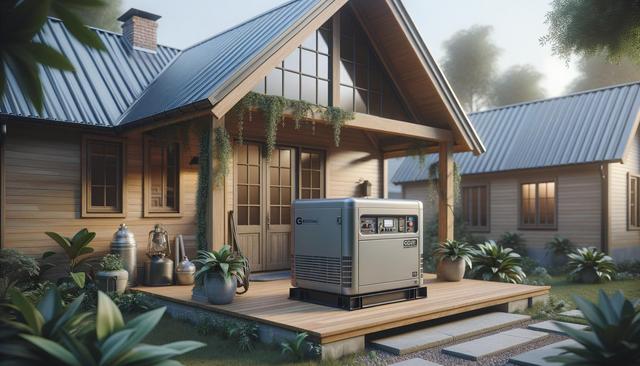Why Consider a Home Backup Generator?
Power outages can disrupt daily life, especially when they occur unexpectedly or last for extended periods. A home backup generator serves as a dependable solution, supplying electricity during times when the main power grid fails. Whether the cause is a storm, equipment failure, or maintenance, having a generator ensures that your home remains functional and safe. This is particularly important for individuals who rely on electrically powered medical devices, work from home, or live in areas prone to severe weather conditions.
Beyond convenience, a backup generator can also help prevent damage to your home. For example, it can keep sump pumps running to avoid basement flooding or maintain the operation of security systems and refrigerators. This level of preparedness can be especially valuable for families and individuals who want to minimize disruption and safeguard their homes from potential consequences of prolonged outages.
Types of Home Backup Generators
There are several types of home backup generators, each with unique features suited for different needs. Understanding the key differences can help homeowners make informed choices. The main categories include:
- Portable Generators: These are smaller, mobile units that are typically fueled by gasoline or propane. They are ideal for short-term use and can power a few essential appliances.
- Standby Generators: Permanently installed outside the home and connected to a fuel source like natural gas or diesel, these units automatically turn on when the power goes out and can handle a much larger electrical load.
- Inverter Generators: Known for their quiet operation and fuel efficiency, inverter generators are suitable for sensitive electronics and recreational use, but usually offer lower power output.
Choosing the right type depends on your power needs, budget, and how frequently outages occur in your area. For example, a standby generator may be more appropriate for regions with frequent storms, while a portable unit might suffice for occasional blackouts.
Factors to Consider Before Installation
Installing a home backup generator involves more than just purchasing a unit. Several important considerations should be evaluated to ensure the system functions reliably when needed. Key factors include:
- Power Requirements: Determine which appliances and systems you want to power during an outage. This will help calculate the total wattage needed.
- Fuel Type: Options include gasoline, propane, natural gas, and diesel. Availability, storage, and cost of fuel should be taken into account.
- Location: Generators should be installed in a well-ventilated area away from windows and doors to prevent carbon monoxide buildup.
- Permits and Codes: Some locations require permits or inspections for generator installation. Be sure to check local regulations.
In addition, working with a qualified electrician or installer is recommended to ensure that the generator is properly connected to your home’s electrical panel and complies with safety standards.
Routine Maintenance and Safety Tips
Like any mechanical system, home backup generators require regular maintenance to remain in good working condition. Neglecting upkeep can lead to performance issues or even equipment failure during an emergency. Basic maintenance tasks include:
- Checking and changing the oil regularly
- Inspecting air filters and spark plugs
- Running the generator periodically to ensure it starts properly
- Keeping the unit clean and free of debris
Safety is another critical aspect. Always operate generators outdoors in well-ventilated areas to avoid carbon monoxide poisoning. Never plug a generator directly into a wall outlet; instead, use a transfer switch to connect it safely to your home’s electrical system. Additionally, ensure that the generator is not overloaded, and always follow the manufacturer’s guidelines for operation and maintenance.
Assessing the Long-Term Value
While the initial investment in a home backup generator can be significant, the long-term benefits often justify the cost. The ability to maintain comfort, safety, and productivity during a power outage is valuable, especially in areas where disruptions are common. Over time, a generator can also protect costly appliances, prevent food spoilage, and reduce the risk of water damage from failed sump pumps or frozen pipes.
Moreover, a professionally installed and well-maintained generator can potentially increase a home’s resale value. Prospective buyers may see the presence of a backup power source as a desirable feature, especially in regions affected by natural disasters or unreliable infrastructure. When evaluating models, consider factors such as fuel efficiency, noise levels, warranty coverage, and customer support to ensure you choose a unit that aligns with your specific needs and expectations.
Finally, it’s wise to compare multiple products and consult with professionals to make an informed decision. While not every home requires a high-capacity standby generator, having some form of backup power can offer long-term peace of mind and security.
Conclusion: Choosing Backup Power with Confidence
Investing in a home backup generator is a proactive step toward ensuring your household remains functional and secure during power outages. With various types and features available, homeowners can find a solution that fits their unique needs and budget. Whether you’re looking to power essential appliances or maintain full household functionality, understanding your options and planning accordingly will help you make a confident decision. Regular maintenance and proper installation further enhance the reliability of your backup power system, providing reassurance when it matters most.












